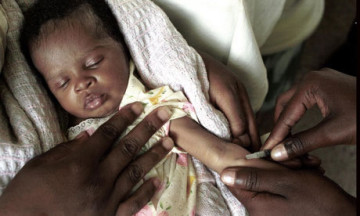Polio is gone, but immunisation is a must
Nigerians home and abroad have been rejoicing following the recent announcement by the World Health Organisation that the country is no longer on the polio-endemic list.
Before now, Nigeria, Afghanistan and Pakistan were the only countries battling with the disease that had left many paraylsed in affected countries.
Polio is a highly infectious viral disease that affects children. According to the WHO, the virus is transmitted person-to-person and its initial symptoms include fever, fatigue, headache, vomiting, stiffness in the neck, and pain in the limbs.
As deadly as it is, there is a vaccine that has been proved to prevent this infection in 99. 99 per cent of children who take it.
It is interesting to note that Nigeria battled with polio, especially among kids, in the North because many parents were misinformed on the ‘side effects’ of the vaccine.
Health workers were killed while trying to get kids vaccinated in some states. But thankfully, increased awareness on the efficacy of the polio vaccine has helped Nigeria to get off the shameful list of affected countries.
Experts, however, note that for Nigeria to remain polio-free, the onus lies on parents, who ultimately take the final decision on the health of their kids.
Professor of virology, Oyewole Tomori, says the best thing any parent can do for their child is to vaccinate them against potential killer diseases like polio.
Tomori, who defines vaccine as a biological preparation that improves immunity against a particular disease, affirms that they have no side effects. So, parents need not fear.
He adds that vaccines only stimulate the body’s immune system to recognise some diseases as foreign and destroy them.
The expert explains that when babies are born, they naturally do not have enough immunity to fight diseases that they will be exposed to in the first six months of their lives. However, if they are given vaccines against these diseases, the body system would have been prepared to fight them.
Tomori adds, “Many parents still worry that vaccines could harm their kids, hence they refuse to let their babies take them. We want to assure parents that vaccines are effective and safe for children and no sincere parent should stop his/her child from taking them.”
The virologist notes that poor vaccination of children is a major factor why Nigeria records the second highest infant deaths in the world after India.
His observation is not far from the truth, as over 97,000 Nigerian children die every year from diarrhoeal infection, a vaccine-preventable disease.
Consultant paediatrician with the Lagos University Teaching Hospital, Idi- Araba, Dr. Ekanem Ekure, says all hands must be on deck to ensure that Nigeria stops contributing to these horrible statistics.
Ekure notes that mothers especially must realise that it is their duty to ensure that their children complete their immunisation schedules as at when due.
Apart from the polio vaccine, here are three important vaccines on the National Immunisation Routine Schedule for all Nigerian babies and it is the duty of every parent to ensure that their child gets it.
Hepatitis B vaccine
Hepatitis B is one of the most infectious killer diseases in the world. It is, however, a vaccine- preventable disease. Family Health Physician, Dr. Femi Omolola, notes that the HPV vaccine has been proved to be 99 per cent effective in preventing the viral infection when given to babies at birth.
Rotavirus vaccine
It is an oral vaccine against rotavirus infection – a common cause of diarrhoea and sickness. It is given as two doses for babies aged two months and three months alongside other routine childhood vaccinations.
The vaccine, called Rotarix, is given as a liquid from a dropper straight into the baby’s mouth for him to swallow.
Rotavirus is a highly infectious stomach bug that typically strikes babies and young children, causing an unpleasant bout of diarrhoea, sometimes with vomiting, tummy ache and fever. Some children who are not given this vaccine may die from rotavirus infection if it is severe.
Haemophilus Influenzae Type B
Hib vaccine prevents serious infections caused by a type of bacteria called Haemophilus influenzae type b. Such infections include meningitis (an infection of the covering of the brain and spinal cord), pneumonia (lung infection), and epiglottitis (a severe throat infection).
Hib vaccine is recommended for all children under the age of five and it is usually given to infants starting at two months old.
Bacillus Calmette-Guerin vaccine
The BCG vaccine is the only tuberculosis vaccine currently available, although there are other TB vaccines under development. It is a relatively inexpensive, safe, and readily available vaccine.
The BCG vaccine is normally given to children as it has been shown to provide very good protection against the disseminated forms of TB in children.
Other vaccines on the national routine immunisation programme in Nigeria include eight DPT (Diphtheria-pertusis-tetanus), measles, yellow fever, and the meningococcal vaccines.
Consultant paediatrician, Dr. Olajide Ojo, advises that in addition to immunising their babies, mothers should also embrace exclusive breastfeeding.
Ojo says, “The first immunisation God designed for a baby is his mother’s breast milk. It naturally prevents and protects them from diseases. It is their right and it should not be denied them. Mothers should breastfeed their babies exclusively, which means not giving them water for the first six months of their lives.”
PUNCH.








